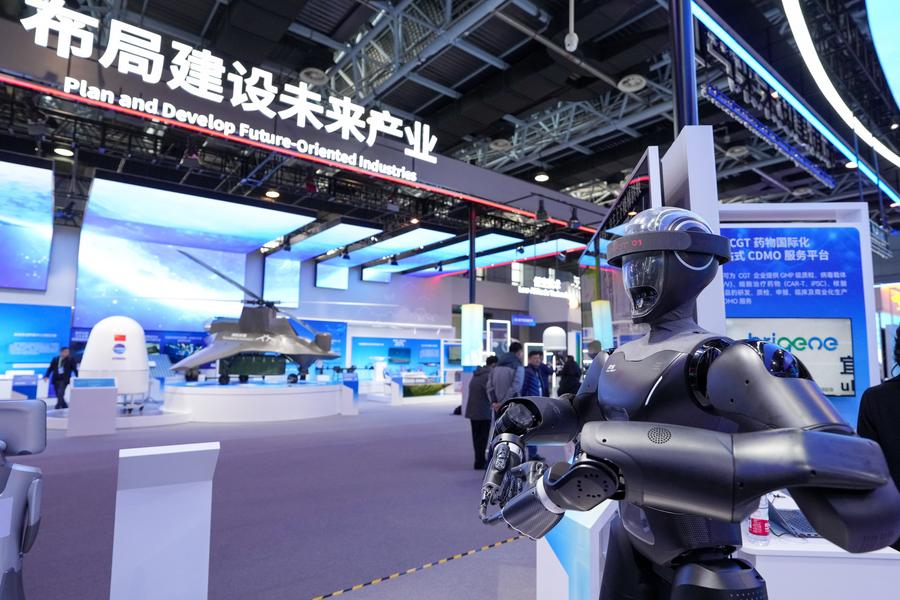
 0 Comment(s)
0 Comment(s) Print
Print E-mail Xinhua, March 31, 2025
E-mail Xinhua, March 31, 2025

A humanoid robot poses during a permanent exhibition at the Zhongguancun Exhibition Center in Beijing, capital of China, March 28, 2025. [Photo/Xinhua]
Taking an intelligent low-altitude aircraft home or walking effortlessly with ultra-thin exoskeleton suit, these futuristic scenarios came to life in an AI-generated short film at the opening ceremony of the China Science Fiction Convention 2025 in Beijing.
At the convention venue in Shougang Park in Beijing's Shijingshan District, humanoid robots greeted visitors while four-legged robots darted by. Attendees were captivated by the unexpected display of cutting-edge technologies and applications.
The convention, jointly hosted by the China Association for Science and Technology and the Beijing municipal government, is a parallel forum of the ongoing 2025 Zhongguancun Forum Annual Conference. As a premier sci-fi industry event, it aims to drive the deep integration of science fiction with technology, culture, and various industries.
Themed "Creating the Future with Scientific Dreams," the convention features over 30 activities across five key segments, including an opening ceremony, professional forums, competitions, and industrial promotion events, with an emphasis on the full-chain cooperation and the commercialization of new sci-fi products and projects.
At the opening ceremony on Friday, the newly released 2025 China Science Fiction Industry Report revealed that in 2024, China's sci-fi industry generated a total revenue of 108.96 billion yuan (about 15.1 billion U.S. dollars). The industry spans five core sectors: sci-fi literature, films and TV, gaming, derivatives, and cultural tourism.
As artificial intelligence and next-generation information technologies advance rapidly, the boundary between science fiction and reality continues to blur. Many attendees noted that as AI Plus (AI+) Initiative progresses, AI and other innovative technologies will greatly enhance sci-fi content creation and IP development, further shaping the industry's future.
At the venue, visitors were transported into space through the "interstellar voyage" experience created by Insitpace (Shandong) Digital Technology Co., Ltd. Equipped with a VR headset, participants were able to sit alongside astronauts in a rocket, explore celestial bodies and transport supplies to a moon base, among others.
This project integrates advanced technologies such as AI and VR, enabling users to not only immerse themselves in a spacecraft experience but also interact with virtual objects by using different gestures.
"AI technology not only assists in script design but also significantly enhances the efficiency of sci-fi content production," said Ma Yuguang, CTO of Insitpace, who noted that AI-powered large models have reduced 3D modeling time from nearly a week to just minutes, significantly lowering labor costs. "In the future, we will introduce AI astronauts to enhance player interaction, making conversations more intelligent and immersive."
According to the report, a total of 169 sci-fi micro-series were released across major platforms in 2024. The adoption of AI-generated content (AIGC) technology has significantly lowered production costs and improved efficiency, unlocking new growth potential for the sci-fi micro-series sector.
With AI and other cutting-edge technologies playing an increasing role, many regions in China have identified the sci-fi industry as a key driver of new economic growth.
Beijing, for example, introduced an action plan earlier this year to boost the sci-fi industry, outlining over 30 policy measures to enhance industrial development, commercialize sci-fi IP, and drive technological innovation. By the end of 2025, Beijing aims to expand its key sci-fi sectors to 60 billion yuan, establishing a well-structured industry ecosystem. By 2027, this figure is expected to surpass 100 billion.
The action plan highlights support for AI, the metaverse, and other emerging technologies, focusing on demonstrating AI-powered sci-fi applications, showcasing AI-generated sci-fi IP scenarios, and advancing AI-driven foundational models in sci-fi content creation.
Official data showed that Beijing is now home to nearly 800 sci-fi enterprises, with the industry reaching a market size of 48 billion in 2024. Sci-fi industrial clusters, including the one centered in Shougang Park, are rapidly taking shape, signaling a booming sci-fi ecosystem.
Renowned sci-fi author Liu Cixin highlighted that China's rapid technological advancements provide a unique real-world foundation for sci-fi storytelling. Breakthroughs in AI, manned spaceflight, and quantum communication serve as a strong inspiration for sci-fi creators.
"AI provides powerful tools for sci-fi content creation," said Wang Zhigang, professor at Tsinghua University's Academy of Arts & Design. "With its immense computing power, AI will drive multi-modal human-machine collaboration, revolutionizing research and development, design, and production, and continuously creating new technological marvels in the era of intelligence."
Go to Forum >>0 Comment(s)